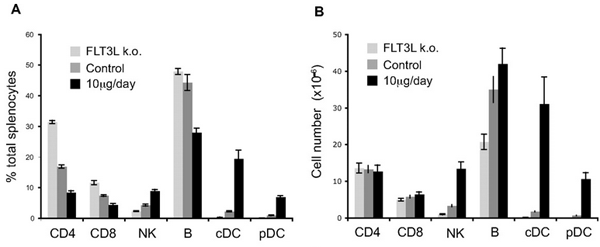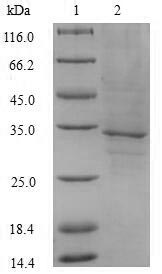
Influence of FLT3L treatment on lymphocyte subpopulations. Method: C57BL/6 mice were injected intraperitoneally with 10 microg daily or were left untreated. (A) Percentages of indicated splenic subpopulations in FLT3L KO, WT control or WT-treated mice.
Fc (human):FLT3 Ligand (human) (rec.)
AG-40B-0119
Protein IDP49771
Product group Proteins / Signaling Molecules
Overview
- SupplierAdipoGen Life Sciences
- Product NameFc (human):FLT3 Ligand (human) (rec.)
- Delivery Days Customer10
- CertificationResearch Use Only
- Concentration1 mg/ml
- Estimated Purity>95%
- Gene ID2323
- Target nameFLT3LG
- Target descriptionfms related receptor tyrosine kinase 3 ligand
- Target synonymsFL, FLG3L, FLT3L, IMD125, fms-related tyrosine kinase 3 ligand, flt3 ligand, fms related tyrosine kinase 3 ligand
- Protein IDP49771
- Protein NameFms-related tyrosine kinase 3 ligand
- Scientific DescriptionFMS-like tyrosine kinase 3 ligand (FLT3L) acts as a growth factor that increases the number of immune cells (lymphocytes (B cells and T cells)) by activating the hematopoietic progenitors. It binds to FLT3 (CD135) which is found on multipotent progenitor (MPP) and common lymphoid progenitor (CLP) cells in mice. FLT3L induces the mobilization of the hematopoietic progenitors and stem cells in vivo which may help the system to kill cancer cells. FLT3L is crucial for steady-state pDC (plasmacytoid dendritic cells) and cDC (classical dendritic cells) development. Deficiency of FLT3L causes a dramatic decrease in DC numbers, whereas increasing its availability increase in DC numbers. - Protein. The receptor-binding domain of human FLT3L (aa1-185) is fused at the N-terminus to the Fc portion of human IgG1. Source: CHO cells. Endotoxin content: 95% (SDS-PAGE). FMS-like tyrosine kinase 3 ligand (FLT3L) acts as a growth factor that increases the number of immune cells (lymphocytes (B cells and T cells)) by activating the hematopoietic progenitors. It binds to FLT3 (CD135) which is found on multipotent progenitor (MPP) and common lymphoid progenitor (CLP) cells in mice. FLT3L induces the mobilization of the hematopoietic progenitors and stem cells in vivo which may help the system to kill cancer cells. FLT3L is crucial for steady-state pDC (plasmacytoid dendritic cells) and cDC (classical dendritic cells) development. Deficiency of FLT3L causes a dramatic decrease in DC numbers, whereas increasing its availability increase in DC numbers.
- Storage Instruction-20°C,2°C to 8°C
- UNSPSC41116100
- SpeciesHuman


